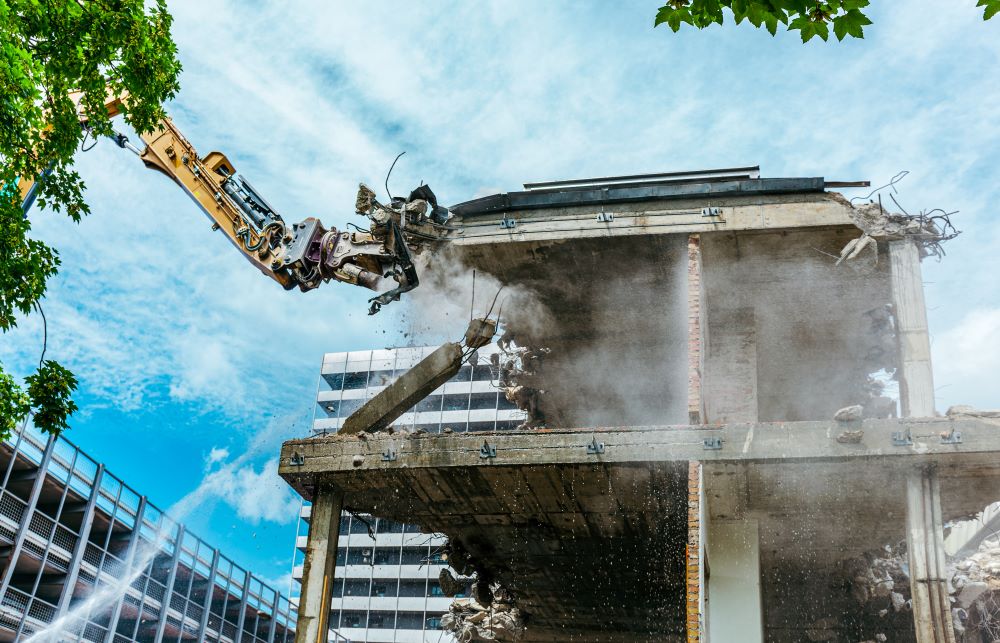
Timeline Planning for Residential Demolition Projects
In order to secure a good end, residential demolition projects may be intricate and diverse, needing careful planning and coordination. Timeline management is a crucial component of this planning process. Planning a timeframe effectively is crucial for demolition operations.
OUR SERVICES
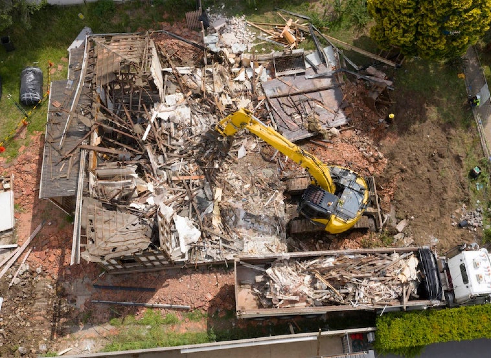
Structure Demolition. Residential, Commercial & Industrial
If your structure poses a health, safety, or environmental risk, demolition can prevent costly citations or fatal accidents. While this may seem daunting, you are just a phone call away from having your residential demolition done professionally, responsibly, and at a great price.
Talk to a Demolition Specialist Now! 916.249.5001
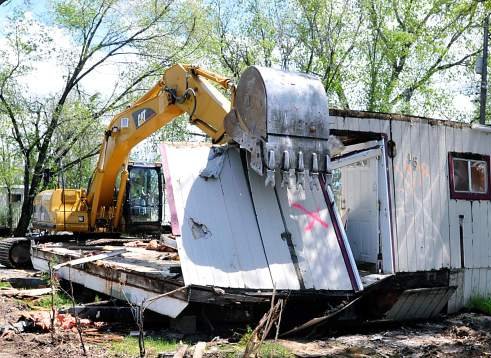
Mobile Home Demolition
We demolish and haul away mobile homes. Any size, anywhere, anyhow. We are fast, clean and competitive. We serve most of Northern California. There are many factors to consider when removing or demolishing your old trailer, mobile home, or manufactured home like: the processes involved, costs, time, contractors, debris, and permits.
Talk to a Demolition Specialist Now! 916.249.5001
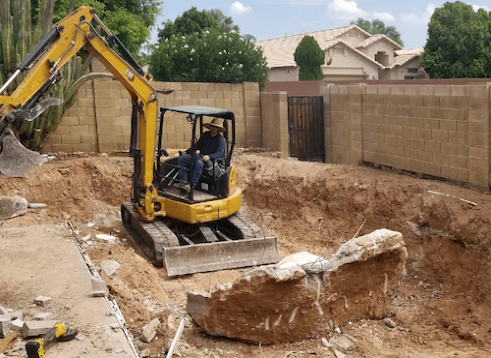
Pool Demolition
When removing a pool in Sacramento, California with the professional demolition team of Maxton Demo, you’re guaranteed peace of mind from beginning to end. From your initial request for an estimate to clean-up, you can expect our pool demolition process that’s completely professional and safe.
Talk to a Demolition Specialist Now! 916.249.5001

Floor Demolition
Flooring demolition, like any other major home renovation work, requires a specific set of skills and tools to be performed properly. You need experts in flooring demolition to get you the best floors possible. Contact us to find out more about how we can help you today.
Talk to a Demolition Specialist Now! 916.249.5001
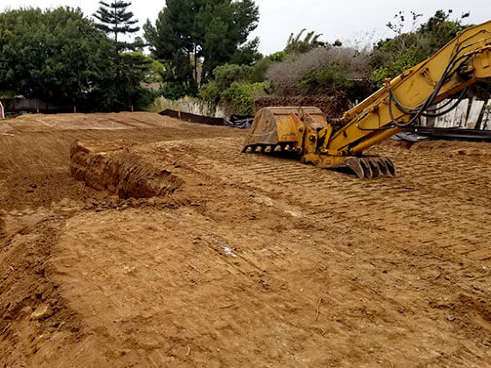
Grading & Excavating
If you need an experienced excavator and grader in Sacramento, call us today. One of the many reasons that residential, commercial, and industrial customers choose to work with us is because we’re able to provide a broad range of services to help construction-related projects get done in less time and at a reduced cost.
Talk to a Demolition Specialist Now! 916.249.5001

Roof Snow Removal
Heavy snow & ice dams can cause significant roof and home damage. Roof Snow removal is our specialty during the winter months. Serving the Sacramento, California area for 10 years, we can get your roof snow removed and promise a quick response and reasonable rates.
Talk to a Demolition Specialist Now! 916.249.5001
Aspects to Take into Account When Creating a Schedule for Residential Demolition Projects
There are a few important things to keep in mind when creating a timeframe for home demolition operations. Understanding these variables is essential for creating an efficient and realistic timeframe, although they may change based on the particular project, the region, and any applicable regulations.
The size and complexity of the demolition project are two of the most important things to take into account. The length of the project, the existence of dangerous chemicals, the need for structural evaluations, and the general state of the structure may all have a big influence on how quickly things happen. For instance, compared to a smaller, single-story building, a bigger, multi-story property with significant asbestos or lead-based paint abatement needs would usually need a longer schedule.
The availability and timing of equipment and specialist contractors is another important consideration. Coordination between a variety of experts is often needed for demolition operations, including structural engineers, asbestos abatement experts, and heavy equipment operators. One of the biggest challenges in developing a timetable is making sure that these resources are available on time and accounting for their lead periods.
Permit approvals and regulatory regulations are also essential to the schedule-planning process. Demolition projects may need permissions, inspections, and approvals from local authorities, including utility companies, building departments, and environmental agencies, depending on the region. Complying with the required lead times and comprehending the particular needs for these procedures may help prevent delays and guarantee compliance.
The timing may also be impacted by the accessibility of disposal sites and the movement of demolition debris. The entire timetable may be impacted by several factors, including the distance to the closest recycling or disposal facility, the capacity of these facilities, and any limitations on the time of trash collection.
Last but not least, the planning of the timeframe for residential demolition projects may also be influenced by the weather and environmental factors. Unfavorable weather conditions, such as persistent rain, snowfall, or strong winds, may cause delays in the demolition process. Similar to this, the timeframe may need to be adjusted in light of environmental constraints like the existence of animals or the need to abide by noise or dust control laws.
Demolition experts can create a thorough and realistic timetable that takes into consideration the particular difficulties and specifications of any home demolition project by carefully weighing these variables, which will eventually result in a successful and effective demolition process.
Pre-Demolition Phase Schedule Establishment
Since it establishes the foundation for the whole demolition process, the pre-demolition phase is a crucial part of the timetable planning for residential demolition projects. A seamless transition into the demolition phase is usually ensured by carefully scheduling and coordinating a number of crucial procedures that are often included in this phase.
Getting the required permissions and approvals is one of the first tasks in the pre-demolition process. Obtaining demolition, environmental, and utility disconnection licenses may be necessary, depending on the site and the particulars of the project. Incorporating these approvals into the schedule planning process requires an understanding of the application procedure, necessary documents, and lead times.
Having hazardous materials evaluations and abatement completed is another essential component of the pre-demolition process. Before demolition can start, many older residential buildings may contain dangerous elements like asbestos or lead-based paint that need to be found and carefully removed. The timetable may be greatly impacted by the scheduling of the hazardous materials evaluation, acquiring the required abatement licenses, and organizing the abatement work with specialist contractors.
In addition, utility disconnections, structural evaluations, and tenant or inhabitant removal might be part of the pre-demolition stage. In order to ascertain the building’s integrity and pinpoint any possible safety issues that may need attention, structural inspections are essential.
Disconnections of utilities, including gas, water, and electricity, need to be planned ahead of time and coordinated with the relevant service providers. If the property is inhabited, the schedule must also take into consideration the occupants’ relocation and the arrangement of moving services.
It is also crucial to make plans for the acquisition and delivery of the tools, supplies, and equipment that will be required throughout the preparatory stage. This might include making sure that large equipment, like bulldozers and excavators, is available, as well as making sure that dumpsters, safety gear, and other supplies needed for demolition arrive on schedule.
Through rigorous planning and timing of all these pre-demolition procedures, demolition experts may produce an extensive schedule that facilitates an effective and successful demolition phase. Delays may be avoided, and the project can stay on schedule from the start with close attention to detail and proactive communication with all stakeholders.
Planning the Demolition Phase Timeline
The actual physical disassembly and removal of the building occur during the demolition phase, which is the focal point of the residential demolition project. Planning this phase’s timing effectively is essential since it has a direct influence on both the demolition work’s successful completion and the project’s overall timeframe.
The order and schedule of the demolition operations are two of the main factors taken into account while determining the timeframe for the demolition phase. This entails meticulously planning out the sequence in which the various structural components will be destroyed, accounting for elements like access points, structural stability, and the effective use of demolition tools.
Project managers may maximize productivity, reduce interruptions, and guarantee the security of the demolition team and the surrounding area by planning the demolition process.
The organization and scheduling of the demolition team are crucial components of the schedule planning for the demolition phase. This involves making certain that heavy equipment operators, qualified workers, and any specialist subcontractors needed for the project are available. To ensure a consistent and effective demolition process, factors like crew size, shift schedules, and the need for breaks or rest times must be taken into consideration in the timeframe.
The management and disposal of demolition trash must be taken into account while calculating the timeframe for the demolition phase. This entails arranging for the material to be transported to the proper recycling or disposal sites and guaranteeing that trucks, dumpsters, and other waste management equipment are available. These waste management responsibilities might be included in the schedule to help avoid delays and guarantee adherence to regional environmental laws.
Any required safety precautions and inspections should also be included in the timetable planning for the demolition phase. This might include arranging for routine safety inspections, liaising with on-site safety staff, and making arrangements for any necessary inspections by regulatory or local authorities. Maintaining a compliant and safe demolition site depends on making sure these safety-related duties are completed on schedule.
Demolition experts may design a timetable that maximizes resource utilization, reduces interruptions, and guarantees the timely and successful completion of the demolition process by meticulously organizing and arranging the many tasks included in the phase. Delivering a home demolition project that satisfies the client’s expectations and complies with all relevant requirements requires this degree of preparation and cooperation.
Planning for the Post-Demolition Phase Timeline
The last step of the residential demolition project is the post-demolition phase, and it is just as crucial to have a well-planned timeframe for this stage. After the physical demolition is over, this phase includes cleaning, site restoration, and any required follow-up work.
The final site cleaning and debris removal are crucial components of the timetable planning for the post-demolition phase. This entails planning the transportation of any leftover demolition debris to the proper disposal or recycling facilities, including any hazardous or recyclable items. Maintaining a clean and safe building site as well as complying with environmental requirements depend on the timely and appropriate disposal of these items.
The post-demolition phase may also include landscaping and site rehabilitation in addition to the disposal of debris. This might include doing things like leveling the ground, patching up holes made by excavations, and repairing any landscape elements that were impacted by the demolition. A seamless transition from the demolition phase to the next stage of the project, whether it be building or site redevelopment, may be ensured by including these site restoration operations in the timetable.
Completing any required certifications or inspections is a crucial part of the post-demolition phase timetable planning. This might include getting occupancy permissions, final demolition permits, or environmental approvals, depending on the site and the particulars of the project. Comprehending the schedule for these certifications and inspections is essential to guaranteeing that the project is finished in accordance with all applicable laws.
The preparation of the timeframe for the post-demolition phase should also take into account any essential follow-up tasks, including resuming utility services, taking down temporary barriers or fencing, and doing a final site cleaning and landscaping. Any delays or interruptions to the project’s overall timetable may be avoided by making sure these tasks are planned and finished on time.
Demolition specialists can make sure that the project moves smoothly from the demolition process to the last phases by meticulously organizing and arranging the post-demolition phase operations. This degree of proactive preparation and attention to detail may help reduce unforeseen delays, keep the project on schedule overall, and provide the customer with a successful home demolition job.
Difficulties and Frequent Postponements in Residential Demolition Projects
Although meticulous preparation of the timeframe may alleviate a great deal of the difficulties and possible setbacks in residential demolition projects, demolition experts may still run into a number of typical roadblocks. Maintaining the project schedule and guaranteeing a successful conclusion may depend on your ability to recognize these obstacles and put plans in place to overcome them.
The existence of unforeseen or unidentified situations is one of the main obstacles to residential demolition projects. This may include the finding of more dangerous chemicals, structural problems, or previously unknown subterranean utilities. These unplanned events may need more evaluations, abatement work, or the coordination of extra resources, all of which may have a substantial influence on the timeframe.
The effect of these unforeseen circumstances may be reduced with careful pre-demolition planning and in-depth site inspections, but some degree of scheduling flexibility is sometimes required to account for them.
Getting specialist contractors and equipment in place and coordinating their availability is another frequent problem in home demolition operations. Professionals from a variety of fields, including structural engineers, asbestos abatement experts, and heavy equipment operators, are often needed for demolition operations.
It may be very difficult to guarantee these resources’ timely availability, especially in markets with strong demand or limited supplies. These scheduling difficulties may be lessened by proactive planning, early booking, and the creation of backup plans.
Residential demolition projects may also be delayed by legal and permission issues. It may take a lot of time to navigate the intricate web of municipal, state, and federal rules and to get the required licenses and approvals. The length of the project might be greatly impacted by unforeseen needs or delays in obtaining necessary clearances.
In order to overcome this difficulty, demolition specialists should keep up to date on the most recent changes to regulations, keep lines of communication open with the appropriate authorities, and factor in extra time to the schedule to accommodate for unforeseen delays.
Challenges in residential demolition operations may also arise from weather and environmental factors. Weather-related issues, such as persistent rain, snowfall, or strong winds, may impede and prolong the demolition process.
Furthermore, the timeframe may need to be adjusted due to environmental constraints like the presence of animals or the need to follow noise or dust control standards. To lessen the effects of these outside variables, include weather and environmental contingencies in the schedule and have backup work plans ready.
Demolition experts can create more resilient and flexible schedules that are better able to endure the unavoidable difficulties that may occur during a home demolition project by foreseeing and preparing for these typical difficulties. By taking a proactive stance, you can help guarantee that the demolition project is completed successfully and on schedule, which will eventually benefit the customer.
Equipment and Programs for Efficient Schedule Development in Residential Demolition Projects
The usage of specialist tools and software has grown in importance in the current era of construction and demolition management for efficient timetable planning and project execution. Professionals in home demolition may increase the efficiency of their job by streamlining their workflow, coordinating better, and using a range of digital tools.
Project management software is one of the most commonly utilized methods for scheduling timelines in demolition projects. Demolition experts can build thorough project plans, assign tasks, manage progress, and keep an eye on the deadline with the help of these platforms, which include Primavera, Microsoft Project, and Asana.
These technologies may assist in making sure that the demolition timetable stays on schedule and that any possible delays are promptly discovered and resolved by centralizing all project information and providing real-time visibility.
Apart from the standard project management software, there are solutions specifically designed for demolition that meet the particular needs of the sector. These programs, such as Demolition Manager or Demolition Planner, often include functions made especially for demolition projects, including the capacity to make thorough demolition plans, calculate material amounts, and provide cost estimates. Demolition specialists may improve their ability to manage timelines and make better-informed judgments throughout the demolition process by using these specific tools.
BIM software is an additional useful tool for scheduling timelines in home demolition projects. Demolition experts may generate 3D models of the current structure using BIM platforms like Autodesk Revit or SketchUp. These models can be used to mimic the demolition process and spot any obstacles or bottlenecks.
Demolition specialists can optimize the schedule, coordinate the activity of different trade contractors, and foresee any problems before they happen by visualizing the demolition process.
Timeline planning for residential demolition projects may potentially benefit from the use of Geographic Information Systems (GIS) tools. These programs, like ArcGIS or Google Earth, provide comprehensive mapping and spatial analysis features that may be used to comprehend the context of the site, find possible entry points, and organize the logistics of the demolition procedure.
Professionals involved in demolition may make better judgments and guarantee that the project complies with site limitations and local legislation by integrating GIS data into the schedule planning.
The Importance Of Scheduling Timelines For Home Demolition Projects That Are Successful
In summary, efficient scheduling is necessary to ensure that home demolition projects are completed successfully. A smooth and successful demolition process may be ensured by taking into account all the many aspects that might affect the timeframe, making a precise project schedule, allocating resources and labor properly, and regularly monitoring and revising the plan.
Recall that each home demolition project is unique and that a range of variables, including project size and complexity, local laws, and environmental concerns, may affect the timetable. You can handle the difficulties of home demolition and come out on top by being organized, speaking clearly with all parties involved, and being ready to adjust to unanticipated obstacles.
Whether you’re starting a whole home remodel or a smaller job, our all-inclusive schedule planning method may help you remain on schedule, cut down on delays, and get the most out of your investment. You may have a stress-free demolition experience and clear the way for your next exciting project by following the instructions provided in this article.
Do you have a Question?
Talk to a Demolition Specialist Now! 916.249.5001
Request Formal Quote